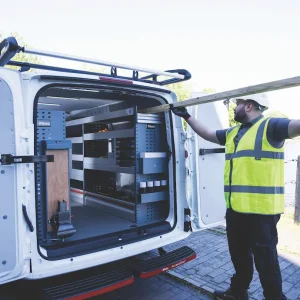In less than 12 months, the world’s biggest carnival hits London in the form of the London 2012 Olympics and Paralympics, and the effect across the capital will mean planning and preparation is needed for businesses to stay on track during the mammoth event. 
“It’s a sizeable challenge, the biggest event and logistical challenge that takes place on the planet, and then it’s followed two weeks later by the second-biggest logistical challenge,” Ian Wainwright, Transport for London’s road freight planning programme manager tells What Van? “We need to make sure London is prepared for the games and that individuals and businesses know what’s going on.”
The big thing for fleets travelling inside the M25 is the Olympic Route Network. It’s plotted across around 1% of London’s roads, and will be actively managed through a variety of measures to ensure predictable journey times for competitors and officials between the Olympic village in east London and the various event venues scattered across the capital. Details of the full ORN are on the www.tfl.gov.uk/orn website.
“A key part of delivering the games is that host cities will guarantee reliable journeys for the Olympic family,” explains Wainwright. “The most important part of that is the athletes and officials – we have to be able to guarantee journey times from accommodation to venue because athletes are competitors not commuters; they have been training for a minimum of four years to achieve something.” He pointed to situations at the 1996 Atlanta Olympics where competitors missed events or were left warming up on a coach stuck in traffic. Since the 2000 Sydney games, the International Olympic Committee has insisted on having an ORN in place as part of a bid to host.
“There is a lot of talk about the ORN, but less than a third of that 1% will be games lanes – people assume they will be along the whole length,” says Wainwright. Games lanes will appear in places where the road is at least two lanes, including bus lanes that will be suspended, and one will be closed off to normal traffic. “Embankment is a good example. There are two lanes in either direction – one will be a games lane,” he says. “We’ll only put games lanes where there is another lane, or where we can suspend a bus lane, and most are the offside carriageway.”
Wainwright points to a journey such as from the athlete’s village round to Wimbledon as a reason for the ORN. “We’ve got to guarantee a journey time, and how long would that journey normally take?”
As well as turning a lane into a games lane across a third of the ORN, other changes will include suspending some parking and loading bays, banning right turns in places where they will hold up the flow of traffic, upgrading traffic lights so they can be managed to maintain the flow along the network and in some places taking out pedestrian crossings where there are a series. The precise details will emerge when the traffic regulation details are confirmed in the autumn. The penalties for contravening regulations will be severe, with fines of £200, reducing to £100 for prompt payment, the likely level. But TfL is keen to say it isn’t looking to the fines for revenue raising. “We want to make sure the roads run as smoothly as possible – as soon as someone contravenes something they disrupt the flow and it interferes with the free flow for everyone else,” says Wainwright. “If everyone complies and we don’t have to issue a single ticket then great. It’s not about raising money, it’s very clearly not.”
“The target is to make sure that businesses or delivery drivers trying to deliver to routes on the network understand that there will be tighter time restrictions, but people within it also have to realise there will be a ripple – there will be a general impact that comes further out,” warns Wainwright. “If 99% of the roads in London haven’t got the ORN, the chances are you will still get around but not in the same way. London will be different during the games, but still in a way to facilitate London to keep working.”
TfL is looking for all businesses and individuals to do “a little bit” to improve the flow of the network and journeys around it. “We’re getting people to think about personal journeys or supplies using four phrases: reducing trips where possible, retiming, rerouting and revising the mode.
“People travel – the question is, can we reduce some of the trips? Is there an opportunity for people to work from home or from a different site?” asks Wainwright. “There are opportunities to reduce travel in those key areas without jeopardising the business. And if not, can they retime – not everyone working 9-5, maybe come in early or late and leave accordingly? That spreads the peaks. We’re trying to encourage people to think about how it will affect them.”
Wainwright also talks about rerouting, in terms of drivers that regularly use London’s roads having knowledge of a number of alternative routes, and being aware of how the ORN will affect them and making alternative choices.
“The key is that businesses can still function, and the key to reducing trips is pre-planning – having conversations with suppliers to make sure you’ve got supplies of things like photocopier paper, toilet rolls etc to cover the weeks of the Olympics, so the only deliveries needed during the games are post, courier etc.”
One particular pinch point for the ORN will be for drivers trying to traverse it. “If we are speeding up journeys on the route network or making it more reliable, you will have a problem if you are trying to cross it,” Wainwright says. “If you get onto the Olympic Route Network with the flow then you could have one of the best journeys you’ve ever had. Lights will be phased for you. But if you go across the route network, your journey will be slower.
“It’s two weeks for the games and another two for the Paralympics, and people need to think through what they are doing in this period.”
Although he wouldn’t point to specific areas or roads that are likely to cause the biggest problems during the games, Wainwright says there are “some areas that if you travel around London today you know where the headaches will be. The ORN is going through some of those areas and we are continuing to identify where the particular hotspots are – both on roads and on public transport.”
He continues: “There will be issues around central London and Eastern access – the ORN is on busy roads. We are here to manage areas we know will be difficult and look at individual trips and see what we can do differently.”
Olympic organisers are targeting businesses in the hotspot areas to make sure they are aware of the details, which are all also on the London 2012 website, and are already offering site-specific advice to around 200 companies covering 370,000 employees.
Companies operating on or around event venues need to be aware of the games’ timetable. Wainwright points to the likes of the beach volleyball tournament taking place at Horse Guards Parade in central London, where there will be four sessions per day of 15,000 people each, meaning 30,000 either arriving or leaving in a short space of time at points across the day. “We know we’ll therefore have to manage the traffic more carefully on Whitehall,” he says.
As well as offering site-specific advice to firms with more than 200 employees, London 2012 organisers are contacting every premises within 400m of the network. “We’re trying to overcompensate for the fact that this is not ideal, but it’s for a limited period and essential for the games.”
The good news for businesses is that the games won’t mean more traffic caused by spectators, although the tube network going out towards east London will be significantly busier in the mornings, and vice versa in the evenings. “These will be a public transport games, spectators get free travel in London as part of the ticket, and there won’t be parking at venues so don’t even try,” declares Wainwright. 
“The general advice to businesses is to identify the impact to you as a business and what you can change; it’s how to change what you do so you still work and profit. If we all do a little bit we can achieve a lot.”
Wainwright’s biggest concern is people. “It’s individuals or businesses believing all this information is targeted at others and not them, so if everyone else does it then they don’t need to change their behaviour. If everyone assumes someone else will change their behaviour then we have a problem.”
Olympic Route Network – the measures employed
¦ Banned turns – particularly where the games lanes are in the right-hand lane, there will be lots of banned right turns to stop people turning across the games lane and blocking them.
¦ Upgraded traffic signals at junctions – can now be actively managed to keep the Olympic Route Network flowing to the detriment of cars trying to cross or join the ORN.
¦ Temporary suspension of loading bays and parking bays.
¦ Occasional removal of pedestrian crossings where there are a whole series of them, so people may have to walk two or three minutes up the road to get to a crossing.
¦ Fines of £200, reduced to £100 for prompt payment, for contravening ORN rules.
What’s happening nationwide?
The 2012 Olympics won’t just affect London. The football tournament takes in a variety of venues (see below), although these are stadia well versed in dealing with large crowds. Less so are the host areas for other sports outside of the capital. Olympic organisers are working hard with businesses particularly in Weymouth and Portland, where the sailing will take place, and in Eton where the rowing and canoe sprint is being hosted, to ensure they know what will be happening in their area. The two other main spots outside the main hub will be Essex, with the mountain biking at Hadleigh Farm, and Lee Valley in Hertfordshire, host of the white water canoeing, although both are predominantly weekend events.
Rowing: 28 July-4 August Olympics, 31 August-2?Sept Paralympics (Eton)
Canoe sprint: 6-11 Aug (Eton)
Sailing: 29 July-11 August Olympics, 1-6 September Paralympics (Weymouth & Portland)
Canoe slalom: 29 July-2 August (Lee Valley White Water Centre)
Mountain biking: 11-12 August (Hadleigh Farm)
Football:
25, 26, 28, 31 July, 1, 3, 4, 10 August (Millennium Stadium, Cardiff)
25, 26, 28, 29, 31 July, 1, 3, 9 August (City of Coventry Stadium)
25, 26, 28 July, 1, 3 August (Hampden Park, Glasgow)
26, 29, 31 July, 1, 3, 4 August (St James’ Park, Newcastle)
26, 29, 31 July, 1, 4, 6, 7 August (Old Trafford, Manchester)
29, 31 July, 1, 4, 6, 7, 9, 11 August (Wembley, London)
Road closures
Of the 26 world championships in the 16 days of the Olympics, there are several events that require road closures. Due to the expected spectator interest, six of them have been scheduled for weekends,
but businesses need to be aware that large parts of central London, and in the case of some cycling events, down into Surrey as well, will be shut off completely.
TfL says, like all interventions, the road closures are designed so that they can be removed the moment they are not needed, but the fact remains that there will be major problems on and near the competition routes on the following dates:
Marathon: Sunday 5 August (women), Sunday 12 August (men), Sunday 9 September (Paralympics)
Walking race: Saturday 4 August (men 20k), Saturday 11 August (men 50k, women 20k)
Road cycling: Saturday 28 July (men), Sunday 29 July (women), Wednesday 1 August (men and women time trial)
Triathlon: Saturday 4 August (women), Tuesday 7 August (men)





